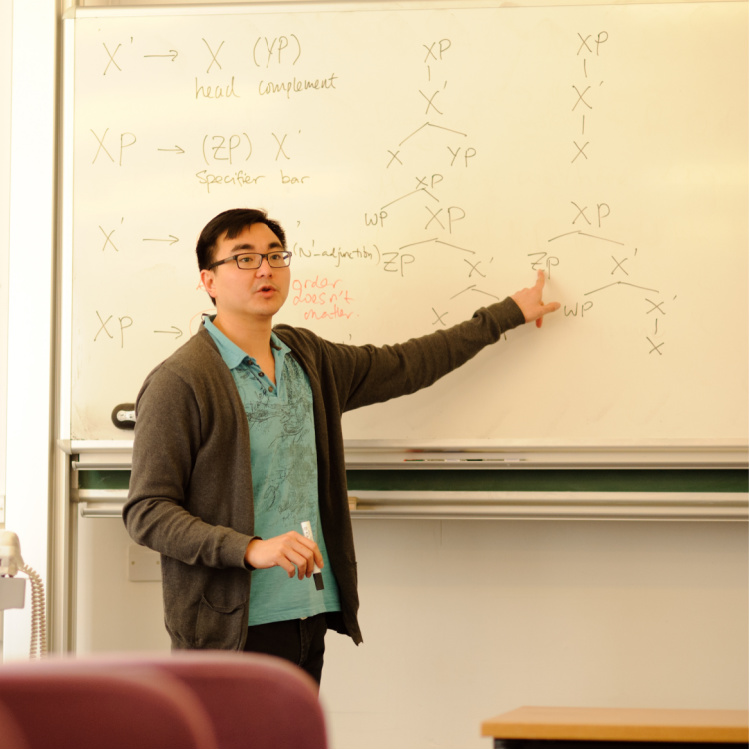View semester dates
2 years part-time

Build a thorough foundation in the science behind how we communicate.
Year of entry: 2026 (September)
Linguistics today is a centrepiece of cognitive science. Study with us and uncover the science behind language, that which differentiates humans from the rest of the animal kingdom.
At York, you'll be taught by expert staff who are active researchers in their fields, meaning you'll be kept up to date with the latest research methods and techniques. You'll build on your existing linguistics knowledge and gain in-depth knowledge of different areas of linguistics but, crucially, how they interface, cross-fertilise and inform one another. You'll learn how properties of sound, structure and society are needed in order to understand a range of phenomena, and how meaning, modality and morphology connect to give an account of communicative acts.
You can tailor your course to your interests and deepen your existing knowledge and understanding of phonetics and phonology, theoretical and comparative syntax, semantics, sociolinguistics or language.
York is one of the highest-ranked centres for research in linguistics in the UK, and the strength and diversity of our research is reflected in our teaching.

I’ve found the staff in the Department to be brilliant. Support staff answer all your questions and lecturers deliver content with genuine enthusiasm that really adds to the experience. Lecturers will adapt their teaching to meet the needs of everyone.
Our course is designed to be flexible, allowing you to design a bespoke programme for yourself that aligns best with your own interests. You can choose one of the three following pathways and will take directed option modules in your chosen pathway.

.jpg)
.jpg)
Over the year, you'll study modules in key areas of linguistics and choose these from a range of different options. You'll hone existing skills in analysis and linguistic investigation and apply them to your dissertation at the end of the year. Our course focuses on high-level skills of analysis, such as collecting, collating and managing data, as well as problem-solving and the presentation of results in the form of reports.
You'll be taught by expert academics who are passionate about their subjects and are active researchers.
You'll be able to tailor your course to your own academic interests in linguistics. You'll choose to focus on one of three pathways:
Over the year, you'll take one core module and six directed option modules from the pathways, alongside your dissertation. You aren't constrained to a single pathway and you don't have to choose every module in a pathway. You can choose up to a maximum of two non-specialist option modules.
Some option module combinations may not be possible. The options available to you will be confirmed after you begin your course.
You can choose a maximum of two non-specialist option modules. Examples may include:
The options available to you will be confirmed after you begin your course. For further information, please get in touch.
Our modules may change to reflect the latest academic thinking and expertise of our staff, and in line with Department/School academic planning.
You'll prepare and write a research dissertation of 9,000 to 12,000 words over Semester 2 and the summer. You'll be asked to submit a dissertation proposal in the middle of Semester 2, which will be reviewed by academic staff. You'll then be allocated a dissertation supervisor and should expect around 5 hours of supervision. You'll submit your dissertation in September.
Topics have ranged from:
Every course at York is built on a distinctive set of learning outcomes. These will give you a clear understanding of what you will be able to accomplish at the end of the course and help you explain what you can offer employers. Our academics identify the knowledge, skills, and experiences you'll need upon graduation and then design the course to get you there.
.jpg)
The support from the staff has been excellent. Staff in the department have given me excellent advice and encouraged me to trust myself.
| Study mode | UK (home) | International and EU |
|---|---|---|
| Full-time (1 year) | £12,000 | £27,250 |
| Part-time (2 years) This is the year 1 fee. Fees for future years are subject to confirmation. |
£6,000 | £13,625 |
Students on a Student Visa are not currently permitted to study part-time at York.
For courses which are longer than one year, the tuition fees quoted are for the first year of study.
UK (home) or international fees? The level of fee that you will be asked to pay depends on whether you're classed as a UK (home) or international student. Check your fee status.
Find out more information about tuition fees and how to pay them.
Discover your funding options to help with tuition fees and living costs.
We'll confirm more funding opportunities for students joining us in 2026/27 throughout the year.
If you've successfully completed an undergraduate degree at York you could be eligible for a 10% Masters fee discount.
We are pleased to work with Chevening Scholars to offer funding for our Masters programmes. Chevening Scholarships provide one year of fully-funded postgraduate study in the UK for international (including EU) students. The scholarships are open to early and mid-career professionals who have the potential to become future leaders.
Find out more about funding specific to Language and Linguistic Science.
You’ll work with world‐leading academics who’ll challenge you to think independently and excel in all that you do. Our approach to teaching will provide you with the knowledge, opportunities, and support you need to grow and succeed in a global workplace.
You'll be taught through a combination of lecture-based modules and small group, hands-on seminars. Your learning journey will take place among a community of internationally recognised experts in every area. You'll have the opportunity to take part in lab and research group meetings, gaining first-hand experience of research in the making with foremost leaders in the field.
Your modules will provide a chance to practice your skills and gain useful feedback on your progress and understanding. A member of the teaching staff will act as your supervisor throughout the degree, to help guide your studies and monitor progress.
Our impressive language and linguistic Science facilities are used to deconstruct and analyse language. We have three main areas:
Comprising two experimental booths with black-out blinds so you can measure pupil response using the world’s most precise video-based eye trackers. Two additional workstations are used for behavioural experiments. These are equipped with multiple E-prime software licences, devices for recording response times and technology for controlling auditory stimuli. The lab also has a generous multi-purpose computer laboratory with access to linguistics software for experimental design and coding.
Using ultrasound imaging and electromagnetic articulography, you can track the movement of the tongue and lips in real-time to analyse speech.
Our professional recording studio can produce clear, quiet, professional recordings suitable for academic use.
You will be based in the Department of Language and Linguistic Science on Campus West. Most of your contact hours will be in or close to Vanbrugh College, with some additional teaching in other locations on Campus West.
Our beautiful green campus offers a student-friendly setting in which to live and study, within easy reach of the action in the city centre. It's easy to get around campus - everything is within walking or pedalling distance, or you can always use the fast and frequent bus service.
A range of assessments formats are used, including:
Through our MSc in Linguistics, you'll learn how to approach highly complex data and understand and explain the underlying generalisations. You'll also develop effective communication, critical thinking and project management skills, which translate readily into any work context.
| Qualification | Typical offer |
|---|---|
| Undergraduate degree | 2.2 or equivalent, in a degree with relevant Linguistics background |
| Other international qualifications | Equivalent qualifications from your country |
If English isn't your first language you may need to provide evidence of your English language ability. We accept the following qualifications:
| Qualification | Minimum requirement |
|---|---|
| IELTS (Academic and Indicator) | 6.5, minimum 6.0 in each component |
| Cambridge CEFR | B2 First: 176, with 169 in each component |
| Oxford ELLT | 7, minimum of 6 in each component |
| Oxford Test of English Advanced | 136, minimum 126 in each component |
| Duolingo | 120, minimum 105 in all other components |
| LanguageCert SELT | B2 with 33/50 in each component |
| LanguageCert Academic | 70 with a minimum of 65 in each component |
| Kaplan Test of English Language | 478-509, with 444-477 in all other components |
| Skills for English | B2: Merit overall, with Pass with Merit in each component |
| PTE Academic | 61, minimum 55 in each component |
| TOEFL | 87, minimum of 21 in each component |
| Trinity ISE III | Merit in all requirements |
For more information see our postgraduate English language requirements.
You may be eligible for one of our pre-sessional English language courses. These courses will provide you with the level of English needed to meet the conditions of your offer.
The length of course you need to take depends on your current English language test scores and how much you need to improve to reach our English language requirements.
After you've accepted your offer to study at York, we'll confirm which pre-sessional course you should apply to via You@York.
Get in touch if you have any questions
If you are new to the field or have only minimal prior background:
If you have considerable prior background:



